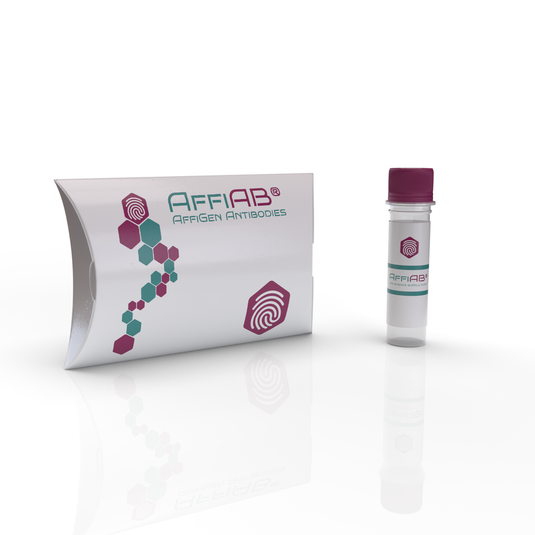AffiAB® Goat Anti-CD63 Polyclonal IgG Antibody
Our Goat Anti-CD63 Polyclonal IgG Antibody is a high-quality polyclonal IgG antibody that helps scientists explore the role of CD63 in various cellular processes.CD63 is expressed in epithelial cells, where it plays a vital role in signal transduction.This antibody is sure to provide reliable results in your research.
Host: Goat
Species: Human
Description:
Goat Anti-CD63 Polyclonal IgG Antibody is an antibody that specifically binds to CD63, a transmembrane protein that is mainly expressed on the surface of late endosomes and lysosomes in cells. CD63 plays a crucial role in vesicular trafficking and fusion, as well as in the modulation of cell adhesion and activation. The Goat Anti-CD63 Polyclonal IgG Antibody is used in various research applications such as western blotting, immunohistochemistry, and flow cytometry to detect and quantify CD63 expression in various cell types and tissues. This antibody has been extensively validated and shown to provide high specificity and sensitivity for detecting CD63.
Gene Identifier/Accession Number: ENSG00000135404
Form: N/A
Concentration: 2.5 mg/mL
Type: Primary
Clonality: Polyclonal
Isotype: IgG
Conjugation: Unconjugated
Application: Western Blot, Immunofluorescence
Storage: For continuous use, store at 2-8 °C for one-two days. For extended storage, store in -20 °C freezer. Working dilution samples should be discarded if not used within 12 hours.
Special instructions: The antibody solution should be gently mixed before use.
Goat Anti-CD63 Polyclonal IgG Antibody
The Goat Anti-CD63 Polyclonal IgG Antibody serves as a crucial tool in the field of cellular and molecular biology, particularly in the study of exosomes and membrane trafficking. CD63, a member of the tetraspanin family, is widely recognized for its involvement in various cellular processes, including signal transduction and vesicle trafficking. This antibody's specificity for CD63 has significant implications in research areas ranging from cancer biology to immunology.
Understanding Goat Anti-CD63 Polyclonal IgG Antibody
Production and Specificity:
Produced by immunizing goats with a segment of the CD63 protein, this polyclonal IgG antibody is designed to recognize multiple epitopes on CD63, enhancing its sensitivity and specificity. This is especially useful in detecting CD63 in different experimental settings, where the protein might be present in various forms or quantities.
Advantages of Polyclonal Antibodies:
Polyclonal antibodies are recognized for their robust performance in a variety of assays, due to their ability to bind to multiple epitopes. This can often lead to stronger and more consistent signals, particularly in complex biological samples.
Applications in Biomedical Research
1. Exosome Research:
One of the primary applications of the Goat Anti-CD63 Polyclonal IgG Antibody is in the study of exosomes. CD63 is a well-established marker of these small extracellular vesicles, and the antibody is used to identify and isolate exosomes for further analysis.
2. Cancer Research:
In cancer research, this antibody helps in studying the role of CD63 in tumor progression and metastasis. It aids in understanding how cancer cells utilize exosomes for communication and how this might be targeted for therapeutic purposes.
3. Immunological Studies:
Given CD63’s involvement in immune responses, the antibody is used to explore immune cell activation and signaling, providing insights into various immune-mediated conditions and diseases.
4. Cell Biology Research:
In cell biology, the Goat Anti-CD63 Polyclonal IgG Antibody is crucial for studying membrane trafficking and signal transduction pathways, furthering our understanding of these fundamental cellular processes.
5. Immunohistochemistry (IHC) and Immunofluorescence (IF):
The antibody is extensively used in IHC and IF for detecting CD63 in tissue sections and cultured cells. This application is vital in visualizing the distribution and expression patterns of CD63 in different cellular contexts.
Conclusion
The Goat Anti-CD63 Polyclonal IgG Antibody is an invaluable tool in the study of exosome biology, cancer research, immunology, and cell signaling. Its ability to specifically target CD63 has opened new avenues for understanding complex cellular mechanisms and disease processes. As research continues to evolve, this antibody will undoubtedly play a key role in advancing our knowledge in these critical areas of biomedical science.

